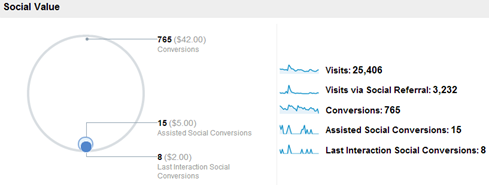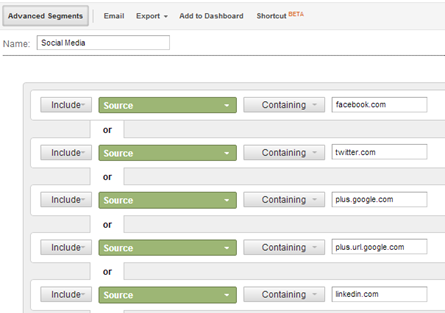
Social Media Marketing (SMM) is one of the most exciting new marketing tools available for the modern marketer that is radically different from what business owners are used to in promoting their brands, products or services. Up to 86% of marketers today subscribe to the idea that their businesses will benefit from Social Media Marketing to the point that even 46% plan to increase their SMM budgets for 2014.
However, according to reports like the one released by Adobe, only a mere 12% of these marketers are confident that they can measure the return from their investments in Social Media Marketing. These same reports also mentioned that one-fifth of these companies don’t know how to measure SMM success rightfully and are only able to use basic metrics for measuring success such as counting the number of likers and social media followers. One they don’t realize however is that more than 80% of these people who “Like” their SMM pages will not even bother to visit again.
The question that is in everyone’s mind at this point is: how to effectively measure social media marketing efforts? The following guide from Digital Marketing Philippines will show you an overview of how you can effectively measure the social media marketing success, using key measures or metrics that will clearly define how effective your campaign efforts are.
Measuring Social Media Marketing Success with Your Reach
The key to success in social media marketing is connecting with people and reach a high level of interaction that will eventually turn them into loyal customers or even brand ambassadors. And this is what you should start to measure – your REACH – or the tangible number of social media users that you have touched and influenced with your content.
Reach will tell you that people are accessing your content and are interested enough to read or view your content that doing so would reflect as a reach metric. Reach will tell you if you are doing something right with your content, in a sense that people will be interested enough to take notice. Different social media channels measure reach and the following are some of the more common metrics:
- Facebook – Likes on your business page
- Twitter – followers
- LinkedIn – connections
- YouTube – subscribers and the number of views
- Blog – visitors
Although you can get reach statistics by doing manually, the more popular social networks like Facebook, Twitter and LinkedIn provide analytics reports that can help you properly identify and quantify your reach. For more in-depth analysis of your social media reach, you can avail of third-party services that can provide you with more comprehensive social media analytics report.
Measuring Social Media Marketing Success with Engagement
After reaching social media users with your content, the next key element to measure is how they would respond to your content. Does your content solicit a high level of engagement from your targeted audiences (denoting high interest) or did it generate little or no engagement at all (denoting lack of interest). Engagement means they care or are interested enough about your content that they have actually taken the next step of action and performed a set of responses. Examples of such actions that signify engagement are as follows:
- Posts – shares as in the case of LinkedIn and Facebook
- Posts – comments from other social media users
- Posts with links – clicks on links you included
- Tweets – responses in terms of direct messages, mentions, and re-tweets
- YouTube – ratings and comments
- Blog – comments and bookmarks
You can track social media engagement manually, but this means having to extract the information directly from each post. You can get a summary and comprehensive report by using the social analytics tool or get the services of third-part providers to consolidate the information for you.
Measuring Social Media Marketing Success with Conversion
The ultimate measurement for your social media marketing efforts that will tell you if your campaign is successful or not is by measuring conversion. This is the key measure that has a direct impact on your bottom line, so therefore it would be a very vital metric to monitor that will tell you how effective your social media marketing campaign is.
But before you even start measuring conversion from your social media efforts, you must first identify what “conversion” is for you and your business. Some business owners and digital marketers consider a signup to a newsletter or download an ebook as conversion, while other businesses consider sales or a product purchase as the only conversion that matters. Define conversion as a favorable action from your targeted audiences that will have a direct impact in building your business. The types of conversion that you could measure and monitor can include the following:
Links going to Landing pages:
- completion of lead generation / contact forms
- registration to download content like ebooks or video
- sign up to a newsletter
Links going to main website pages:
- Online purchase
- Fill out quotation inquiry
- Click on links to advertisers
- Access chat feature for inquiry
- Fill out inquiry form
- Register to an event or webinar
- Time spent on a particular page
Social network pages
- Social interaction through shares, likes or follows
- Video views
- Download app
As you can see from the list above, conversion activities like lead generation or sales usually occur outside the social network facility and into landing pages or main websites. Social media is effective in attracting targeted audiences to these pages and therefore is your main bridge to connecting your potential customers to your products and services. Tracking conversion however is important for measuring success and you can do so by integrating analytics code with your links. This code can be setup from whatever analytics tool you would like to use and there are many to choose from – both paid and free. A good rule to follow is to start with one of the most basic but very effective tool for measuring these metrics – Google Analytics.
Measuring Social Media Marketing Success Using Google Analytics
If you only need basic analytics and have no customization or specialization requirements, Google Analytics would be the best tool to use, covering up to 95% of your basic tracking needs. Getting well adept in Google Analytics will make it easier for you to adapt and master other more complicated, and usually paid, analytics tools. The following provides an overview of how you can make use of Google Analytics to measure your social media success:
Learn How to Set Up Your Goals
Defining your goals will tell the Google Analytics tools what it is you would want to track. As mentioned earlier in the conversions sections, your goal can be based anywhere from signups for mailing lists to sales and orders. A more comprehensive process on how you can setup these goals are provided by Google Support.
A goal can be as simple as tracking URL destination, which is completed when the visitor lands on the specified page like the final order confirmation page. You can setup goals to provide even more detailed information like tracking each process step customers go through when using your shopping cart – monitoring how many proceed to sales or abandon the process.
Get Better Insights from Social Media Reports

The Traffic Sources portion of Google Analytics will provide you information about social value, particularly when tracking from which social network your traffic is coming from, interactions visitors performed that led them to your page, or conversions that they have undergone through that can be tracked down by source traffic.
Get More detailed with Advanced Segments
The social media reports generated by Google Analytics will tell you traffic sources from major social networks. However, if you are using specialized networks or those catering only to a specific industry or niche, making use of the Advanced Segments will provide you with deeper insights that you can use. This is good for filtering out data based on what you require for your business.

One example of how you can make use of Advanced Segments is to categorize social media traffic sources based on media focus, like grouping Pinterest, Flickr and other image sharing sites and video-based social networks like Vimeo and YouTube to another. This will be good if you are making use of various types of content with your social media marketing campaign.
Other Tools for Measuring Social Media Marketing Success
As mentioned earlier, there are several tools available that can help you track and measure social media success aside from Google Analytics. It would be best to get familiar with these tools so you can select which ones will work best with your industry, niche and type of content.
- HootSuite
- SocialMention
- Klout
- Facebook Insights
- Twitter Analytics
- Buffer
- TweetReach
- Keyhole
Lastly, tracking and monitoring the information you get from these methods will be of no use if you fail to analyze and check if your social media marketing efforts are successful or not – and make adjustments based on the insights you derived. As you can see, traditional ROI metrics may not be effective in tracking down social media success, as success in social media is broken down to how well you have interacted and engaged with targeted audiences – and how these interactions translate into actions that will affect your bottom line.
Jomer B. Gregorio is a well-rounded expert when it comes digital marketing. Jomer is also known as a semantic SEO evangelist and practitioner. Check out our Digital Marketing Services today and let us help you in achieving positive and profitable results for your business.
